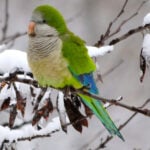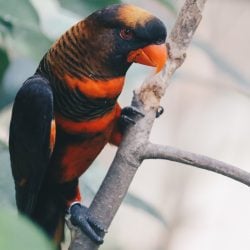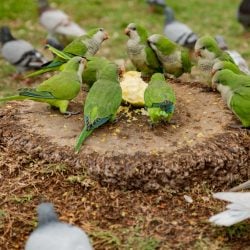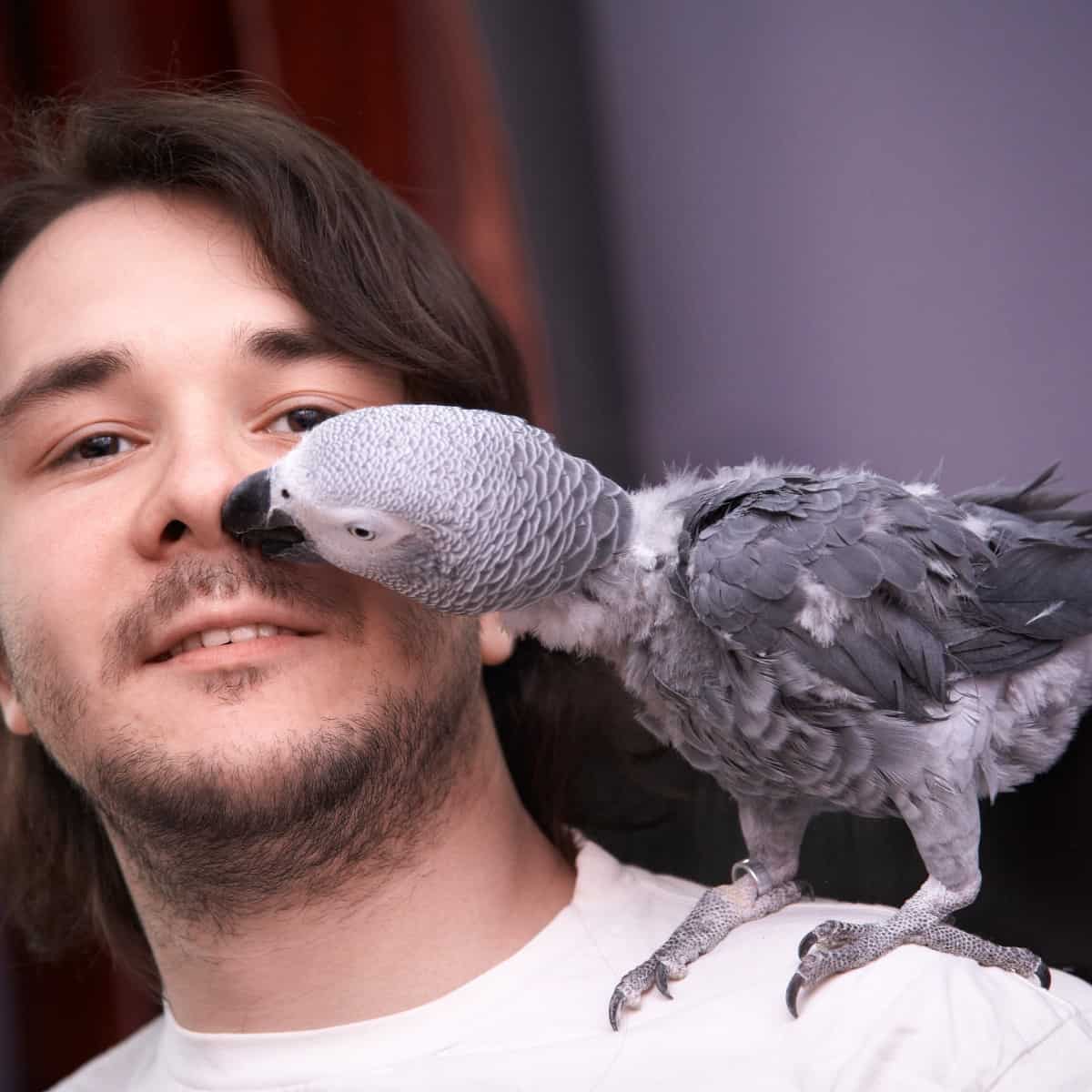Last Updated on by Catherine Tobsing
David K. reports,
I have a White Faced Grey that just loves to sit in his cage and scream.
I get him out several times a day and he’s very personable. What can I do to quiet him down a bit?
Thank you
Catherine replied,
Dear David
Are you responding to your bird when he screams by going over to let him out? Stop it.
Please do your best to not reply to him right away when he screams.
Wait until he stops to reply at all.
If he keeps it up and you can’t get a moment to reply when he is quiet, then while out of sight, while he is screaming, make some loud noise.
Like smacking a pot with a spoon.
He will stop screaming.
Then in a few minutes, before he starts up again, call out to him. He should be responding to you, not you responding to him all the time.
Are his wings clipped? If you let him out of his cage does he fly off or just hang out?
Is he in another room so he is calling to you from there?
If so, can you move the cage so that he can see you during the day?
He is basically doing what birds do. Calling out to find out where his besties are and expecting them to respond.
He is a family member and he just wants to be with you.
Perhaps not on you, but in the same area.
Here are some tips on how to get your African Grey parrot to stop screaming:
- Do not give attention to the screaming. This includes looking at the bird, talking to the bird, or even touching the bird. When you give attention to the screaming, you are rewarding the behavior and make it more likely to happen again.
- Redirect the screaming. If your bird starts to scream, try to redirect its attention to something else, such as a toy or a game. You can also try to talk to the bird in a calm voice.
- Provide plenty of stimulation. African Grey parrots are very intelligent birds and need plenty of stimulation to keep them from getting bored. Make sure your bird has plenty of toys to play with and that it is able to spend time outside of its cage.
- Take your bird for regular walks. Taking your bird for regular walks is a great way to give it some exercise and fresh air. It can also help to reduce boredom and stress, which can lead to screaming.
- Get a second bird. If you can, getting a second bird can help to reduce the amount of screaming. This is because birds are social creatures and they need interaction with other birds.
If you have tried all of these things and your bird is still screaming, you may want to consult with a certified animal behaviorist. They can help you to determine the underlying cause of the screaming and develop a plan to address it.
Here are some additional tips that may help:
- Make sure your bird is getting enough sleep. African Grey parrots need around 10-12 hours of sleep per night.
- Avoid leaving your bird alone for long periods of time. If you have to leave, make sure your bird has plenty of toys and food to keep it occupied.
- If your bird is screaming because it is bored or stressed, try to identify the source of the boredom or stress and address it.
- Be patient and consistent with your training. It may take some time for your bird to learn that screaming is not an effective way to get attention.
Additional tips
- Limit the Light, African greys are often extra noisy when they’re over-stimulated. The amount of light, dark and quiet time your African Grey receives influences its noise level.
- If he receives 15 hours of daylight or more, his hormone levels rise, making him ready to breed, and he becomes more aggressive and noisier. Expose him to no more than 12 hours of light per day. When you want your African Grey to quiet down at night, cover his cage with an opaque cover. African Greys often begin making noise when the sun comes up, so keep the cage cover on if you’ll be sleeping late.
- Yes, it is important to avoid yelling, shouting, insulting, banging on your African Grey’s cage bars or punishing him for being noisy. These actions will only make the problem worse and may even damage your relationship with your bird.
- If your African grey is constantly screeching, squawking or making unreasonable noise, it is important to first check to make sure he is not injured and nothing is wrong in his cage. He might be hurt or upset about spoiled food, a broken toy, or a dead insect in his water bowl.
- If you can’t find anything wrong, it is best to take him to a vet for a thorough examination to rule out health problems that might be causing him pain or distress.
Here are some additional tips on how to deal with noisy African greys
- Identify the cause of the noise. African Greys may be noisy for a variety of reasons, including boredom, loneliness, or fear. Once you know the cause, you can take steps to address it.
- Provide your African Grey Parrot with plenty of enrichment. This includes toys, perches, and activities that will keep your bird entertained and engaged. A bored African Grey is more likely to become noisy.
- Spend time with your African Grey.
African Greys are social creatures and need interaction with their owners. Spending time with your bird will help to reduce boredom and loneliness, which can lead to noise.
Make sure your cockatiel has a safe and comfortable place to sleep.
An African Grey that is tired is less likely to be noisy.
Ignore the noise.
If your African Grey is making noise for attention, the best thing to do is to ignore it. This will teach your bird that noise will not get them what they want.
Use positive reinforcement.
When your African Grey is quiet, reward them with a treat or praise.
This will help your bird to associate quiet behavior with positive consequences.
It is important to remember that African Grey parrots are naturally noisy birds.
However, by following these tips, you can help to reduce the amount of noise they make.
Best of luck
Catherine
Author Profile
Latest entries
 The Traveling BirdJune 26, 2025Can You Name 5 Parrot Species That Are Living Wild in the USA?
The Traveling BirdJune 26, 2025Can You Name 5 Parrot Species That Are Living Wild in the USA? Bird BehaviorJune 26, 2025How is it Parrots Are Problem Solvers Social Animals and Even Use Tools?
Bird BehaviorJune 26, 2025How is it Parrots Are Problem Solvers Social Animals and Even Use Tools? Bird & Parrot AnatomyJune 25, 2025How a Tiny Chemical Modification Makes Parrots Nature’s Living Paintings
Bird & Parrot AnatomyJune 25, 2025How a Tiny Chemical Modification Makes Parrots Nature’s Living Paintings PigeonsJune 20, 2025How Do Parrots Thrive in Cities Outside Their Native Habitats?
PigeonsJune 20, 2025How Do Parrots Thrive in Cities Outside Their Native Habitats?




